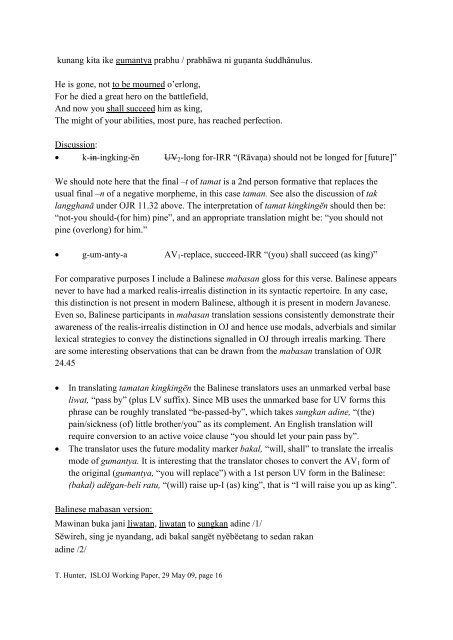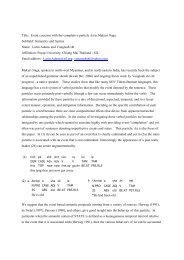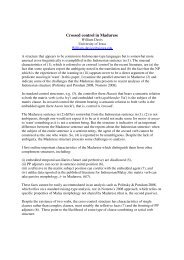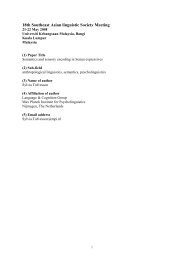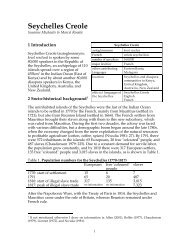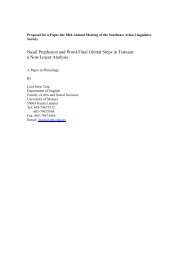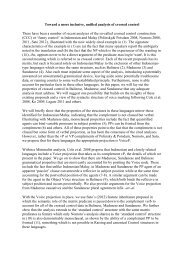Working Paper on Irrealis, Imperative Mode and Complementation ...
Working Paper on Irrealis, Imperative Mode and Complementation ...
Working Paper on Irrealis, Imperative Mode and Complementation ...
Create successful ePaper yourself
Turn your PDF publications into a flip-book with our unique Google optimized e-Paper software.
kunang kita ike gumantya prabhu / prabhāwa ni guṇanta śuddhânulus.<br />
He is g<strong>on</strong>e, not to be mourned o’erl<strong>on</strong>g,<br />
For he died a great hero <strong>on</strong> the battlefield,<br />
And now you shall succeed him as king,<br />
The might of your abilities, most pure, has reached perfecti<strong>on</strong>.<br />
Discussi<strong>on</strong>:<br />
k-in-ingking-ӗn UV2-l<strong>on</strong>g for-IRR “(Rāvaṇa) should not be l<strong>on</strong>ged for [future]”<br />
We should note here that the final –t of tamat is a 2nd pers<strong>on</strong> formative that replaces the<br />
usual final –n of a negative morpheme, in this case taman. See also the discussi<strong>on</strong> of tak<br />
langghanā under OJR 11.32 above. The interpretati<strong>on</strong> of tamat kingkingӗn should then be:<br />
“not-you should-(for him) pine”, <strong>and</strong> an appropriate translati<strong>on</strong> might be: “you should not<br />
pine (overl<strong>on</strong>g) for him.”<br />
g-um-anty-a AV1-replace, succeed-IRR “(you) shall succeed (as king)”<br />
For comparative purposes I include a Balinese mabasan gloss for this verse. Balinese appears<br />
never to have had a marked realis-irrealis distincti<strong>on</strong> in its syntactic repertoire. In any case,<br />
this distincti<strong>on</strong> is not present in modern Balinese, although it is present in modern Javanese.<br />
Even so, Balinese participants in mabasan translati<strong>on</strong> sessi<strong>on</strong>s c<strong>on</strong>sistently dem<strong>on</strong>strate their<br />
awareness of the realis-irrealis distincti<strong>on</strong> in OJ <strong>and</strong> hence use modals, adverbials <strong>and</strong> similar<br />
lexical strategies to c<strong>on</strong>vey the distincti<strong>on</strong>s signalled in OJ through irrealis marking. There<br />
are some interesting observati<strong>on</strong>s that can be drawn from the mabasan translati<strong>on</strong> of OJR<br />
24.45<br />
In translating tamatan kingkingӗn the Balinese translators uses an unmarked verbal base<br />
liwat, “pass by” (plus LV suffix). Since MB uses the unmarked base for UV forms this<br />
phrase can be roughly translated “be-passed-by”, which takes sungkan adine, “(the)<br />
pain/sickness (of) little brother/you” as its complement. An English translati<strong>on</strong> will<br />
require c<strong>on</strong>versi<strong>on</strong> to an active voice clause “you should let your pain pass by”.<br />
The translator uses the future modality marker bakal, “will, shall” to translate the irrealis<br />
mode of gumantya. It is interesting that the translator choses to c<strong>on</strong>vert the AV1 form of<br />
the original (gumantya, “you will replace”) with a 1st pers<strong>on</strong> UV form in the Balinese:<br />
(bakal) adӗgan-beli ratu, “(will) raise up-I (as) king”, that is “I will raise you up as king”.<br />
Balinese mabasan versi<strong>on</strong>:<br />
Mawinan buka jani liwatan, liwatan to sungkan adine /1/<br />
Sӗwireh, sing je ny<strong>and</strong>ang, adi bakal sangӗt nyӗbӗetang to sedan rakan<br />
adine /2/<br />
T. Hunter, ISLOJ <str<strong>on</strong>g>Working</str<strong>on</strong>g> <str<strong>on</strong>g>Paper</str<strong>on</strong>g>, 29 May 09, page 16


